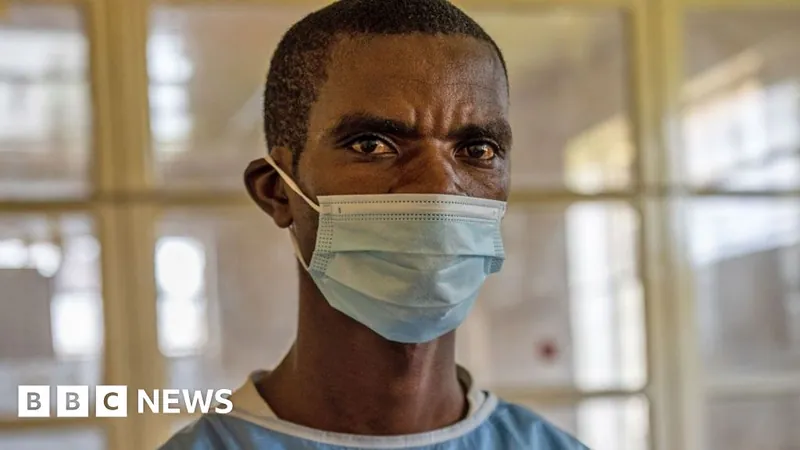
Mpox Cases in DR Congo Show Signs of Decline, but Experts Urge Caution
2024-11-23
Author: Yan
The Democratic Republic of Congo (DR Congo) is witnessing a promising decline in mpox (formerly known as monkeypox) cases, according to reports from medical professionals and the World Health Organization (WHO). Following the rollout of vaccinations last month, health workers at the epicenter of the outbreak in eastern DR Congo have observed a marked decrease in new infections.
WHO officials indicated it is still too early to fully assess the impact of the newly introduced vaccines, yet preliminary data suggests cases may be "plateauing." The outbreak in DR Congo has been severe, with estimates indicating that approximately 900 individuals have succumbed to the disease this year alone.
As a global public health emergency, the threat of mpox remains significant. An alarming number of 19 countries across Africa have reported ongoing infections, raising concerns about the disease’s spread.
In September, a BBC team reported from a clinic in Lwiro, a rural community near Bukavu, where the Lwiro hospital was inundated with infected patients. Healthcare workers described chaotic conditions, with patients sharing beds and doctors overwhelmed by the influx. However, recent visits to the same facility have painted a much brighter picture. Nurse Emmanuel Fikiri noted that at present, the hospital can effectively manage up to 60 patients, a substantial improvement made possible by vaccinations and support from international partners.
In October, DR Congo began its mpox vaccination campaign after receiving 265,000 doses from the global community. So far, over 50,000 individuals have been vaccinated, particularly targeting high-risk groups in the Eastern provinces. Unfortunately, it has been noted that children are disproportionately affected, comprising about 30% of those infected, and they have not been part of the vaccination program until recently. This week, the WHO approved a new vaccine from Japan intended for children.
Although some health professionals, including Nurse Jackson Murhula, expressed cautious optimism with a noticeable decrease in daily new cases—from 10 to 15 daily earlier to just 2 or 3—he emphasized that the situation is still precarious. The community is urged to continue vigilance, as new cases continue to surface.
Among the affected is three-year-old Atukuzwe Banissa, who was hospitalized due to painful symptoms that began with teary eyes and quickly progressed to sores. His case underscores the ongoing struggles faced by families and the medical community in combating mpox.
Dr. Samuel Boland, a WHO incident manager for mpox, highlighted that over 96% of new global cases this year have occurred in DR Congo, Uganda, and Rwanda. While the situation in DR Congo appears to be improving, he warned that it is too soon to declare the outbreak officially under control.
With international efforts ramping up, mpox vaccination initiatives have begun in neighboring countries like Rwanda and Nigeria. Experts assert that ongoing interventions, including vaccination campaigns, enhanced surveillance, and improved laboratory capacity, are crucial to managing the situation as cases continue to emerge in various regions.
WHO Director-General Tedros Ghebreyesus called for a coordinated global response, noting that mpox has spread beyond Africa, with cases reported in the UK, US, Sweden, India, Germany, Thailand, and Pakistan. With collective efforts, public health authorities hope to see a significant decrease in cases by early next year.
While some positive signs emerge in DR Congo's battle against mpox, experts caution that the fight is far from over. Continued vigilance and community cooperation will be vital in the months ahead as the world grapples with the ramifications of this health crisis.





 Brasil (PT)
Brasil (PT)
 Canada (EN)
Canada (EN)
 Chile (ES)
Chile (ES)
 España (ES)
España (ES)
 France (FR)
France (FR)
 Hong Kong (EN)
Hong Kong (EN)
 Italia (IT)
Italia (IT)
 日本 (JA)
日本 (JA)
 Magyarország (HU)
Magyarország (HU)
 Norge (NO)
Norge (NO)
 Polska (PL)
Polska (PL)
 Schweiz (DE)
Schweiz (DE)
 Singapore (EN)
Singapore (EN)
 Sverige (SV)
Sverige (SV)
 Suomi (FI)
Suomi (FI)
 Türkiye (TR)
Türkiye (TR)